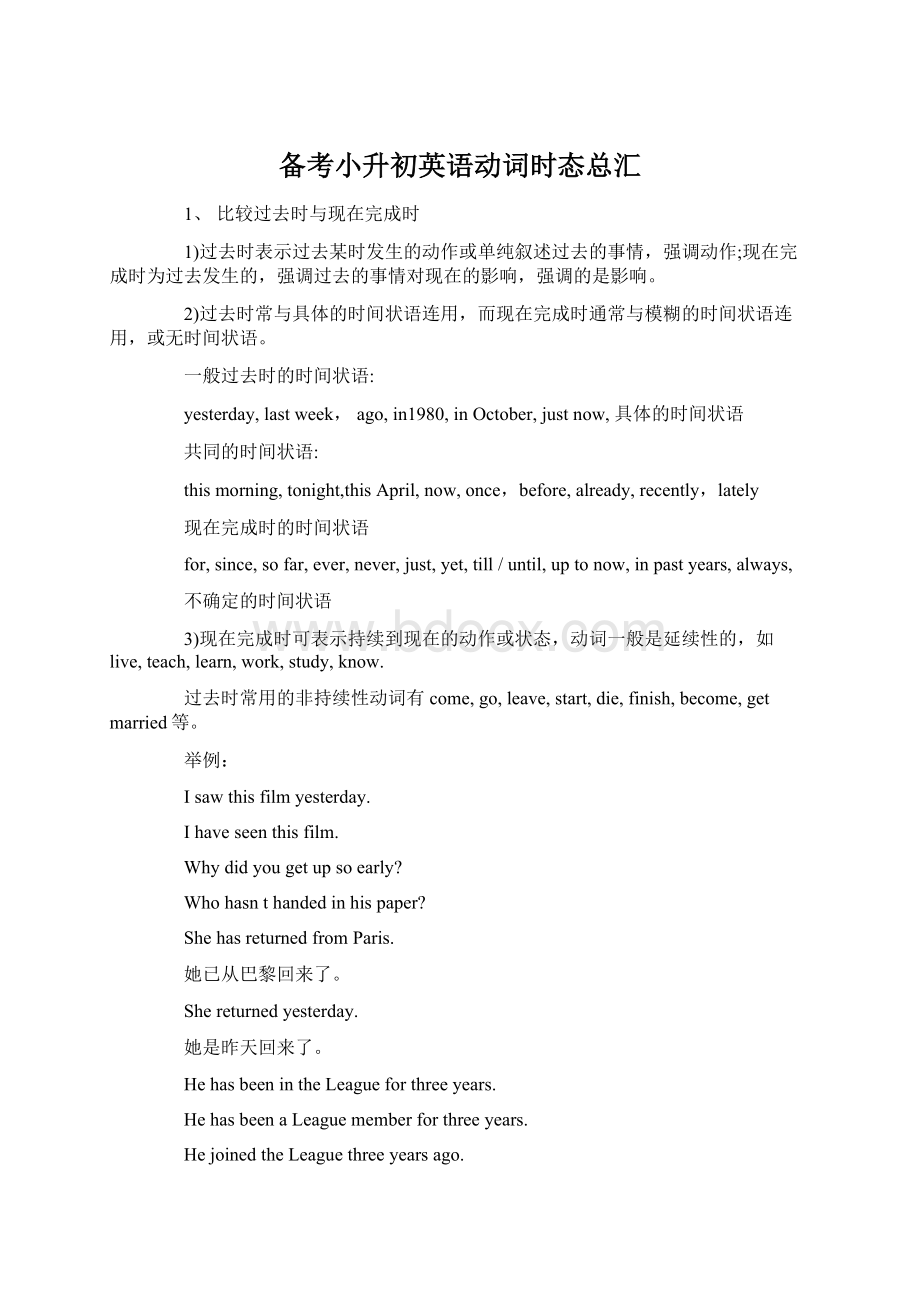备考小升初英语动词时态总汇.docx
《备考小升初英语动词时态总汇.docx》由会员分享,可在线阅读,更多相关《备考小升初英语动词时态总汇.docx(9页珍藏版)》请在冰豆网上搜索。

备考小升初英语动词时态总汇
1、比较过去时与现在完成时
1)过去时表示过去某时发生的动作或单纯叙述过去的事情,强调动作;现在完成时为过去发生的,强调过去的事情对现在的影响,强调的是影响。
2)过去时常与具体的时间状语连用,而现在完成时通常与模糊的时间状语连用,或无时间状语。
一般过去时的时间状语:
yesterday,lastweek,ago,in1980,inOctober,justnow,具体的时间状语
共同的时间状语:
thismorning,tonight,thisApril,now,once,before,already,recently,lately
现在完成时的时间状语
for,since,sofar,ever,never,just,yet,till/until,uptonow,inpastyears,always,
不确定的时间状语
3)现在完成时可表示持续到现在的动作或状态,动词一般是延续性的,如live,teach,learn,work,study,know.
过去时常用的非持续性动词有come,go,leave,start,die,finish,become,getmarried等。
举例:
Isawthisfilmyesterday.
Ihaveseenthisfilm.
Whydidyougetupsoearly?
Whohasnthandedinhispaper?
ShehasreturnedfromParis.
她已从巴黎回来了。
Shereturnedyesterday.
她是昨天回来了。
HehasbeenintheLeagueforthreeyears.
HehasbeenaLeaguememberforthreeyears.
HejoinedtheLeaguethreeyearsago.
Ihavefinishedmyhomeworknow.
---WillsomebodygoandgetDr.White?
---Hesalreadybeensentfor.
句子中如有过去时的时间副词时,不能使用现在完成时,要用过去时。
Tomhaswrittenalettertohisparentslastnight.
Tomwrotealettertohisparentslastnight.
2用于现在完成时的句型
1)Itisthefirst/secondtime.that结构中的从句部分,用现在完成时。
ItisthefirsttimethatIhavevisitedthecity.
Itwasthethirdtimethattheboyhadbeenlate.
2)Thisisthethat结构,that从句要用现在完成时.
ThisisthebestfilmthatIveseen.
这是我看过的最好的电影。
ThisisthefirsttimeIveheardhimsing.这是我第一次听他唱歌。
典型例题
---Doyouknowourtownatall?
---No,thisisthefirsttimeI___here.
A.wasB.havebeenC.cameD.amcoming
答案B.Thisisthefirsttime后面所加从句应为现在完成时,故选B。
---Haveyou____beentoourtownbefore?
---No,itsthefirsttimeI___here.
A.even,comeB.even,havecomeC.ever,comeD.ever,havecome
答案D.ever意为曾经或无论何时,反意词为never,此两词常用于完成时。
ThisisthelargestfishIhaveeverseen.Itis/wasthefirsttime+that-clause的句型中,从句要用完成时。
注意:
非延续性动词的否定形式可以与表示延续时间的状语连用。
即动作不发生的状态是可以持续的。
Ihavereceivedhisletterforamonth.
Ihaventreceivedhisletterforalmostamonth.
3比较since和for
Since用来说明动作起始时间,for用来说明动作延续时间长度。
Ihavelivedhereformorethantwentyyears.
IhavelivedheresinceIwasborn..
Myaunthasworkedinaclinicsince1949.
Somenewoilfieldshavebeenopenedupsince1976.
IhaveknownXiaoLisinceshewasalittlegirl.
MybrotherhasbeenintheYouthLeaguefortwoyears.
Ihavenotheardfrommyuncleforalongtime.
注意:
并非有for作为时间状语的句子都用现在完成时。
Iworkedhereformorethantwentyyears.
Ihaveworkedhereformanyyears.
小窍门:
当现在完成时+一段时间,这一结构中,我们用下面的公式转化,很容易就能排除非延续动词在完成时中的误使。
1)TomhasstudiedRussianforthreeyears.
=TombegantostudyRussianthreeyearsago,andisstillstudyingitnow.
2)Harryhasgotmarriedforsixyears.
=Harrybegantogetmarriedsixyearsago,andisstillgettingmarriednow.
显然,第二句不对,它应改为Harrygotmarriedsixyearsago.或Harryhasbeenmarriedforsixyears.
4since的四种用法
1)since+过去一个时间点。
Ihavebeenheresince1989.
2)since+一段时间+ago
Ihavebeenheresincefivemonthsago.
3)since+从句
Greatchangeshavetakenplacesinceyouleft.
Considerabletimehaselapsedsincewehavebeenhere.
4)Itis+一段时间+since从句
ItistwoyearssinceIbecameapostgraduatestudent.
5延续动词与瞬间动词
1)用于完成时的区别
延续动词表示经验、经历;瞬间动词表示行为的结果,不能与表示段的时间状语连用。
Hehascompletedthework.他已完成了那项工作。
Iveknownhimsincethen.我从那时起就认识他了。
2)用于till/until从句的差异
延续动词用于肯定句,表示做直到瞬间动词用于否定句,表示到,才
Hedidntcomebackuntiltenoclock.
他到10点才回来。
Hesleptuntiltenoclock.
他一直睡到10点。
典型例题
1.Youdontneedtodescribeher.I___herseveraltimes.
A.hadmetB.havemetC.metD.meet
答案B.首先本题后句强调对现在的影响,我知道她的模样,你不用描述。
再次,severaltimes告知为反复发生的动作,因此用现在完成时。
2.---Imsorrytokeepyouwaiting.
---Oh,notatall.I___hereonlyafewminutes.
A.havebeenB.hadbeenC.wasD.willbe
答案A.等待的动作由过去开始,持续到现在,应用现在完成时。
6过去完成时
1)概念:
表示过去的过去
----|-------|-----|----其构成是had+过去分词构成。
那时以前那时现在
2)用法
a.在told,said,knew,heard,thought等动词后的宾语从句。
ShesaidshehadneverbeentoParis.
b.状语从句
在过去不同时间发生的两个动作中,发生在先,用过去完成时;发生在后,用一般过去时。
Whenthepolicearrived,thethieveshadrunaway.
c.表示意向的动词,如hope,wish,expect,think,intend,mean,suppose等,用过去完成时表示原本,未能
Wehadhopedthatyouwouldcome,butyoudidnt.
3)过去完成时的时间状语before,by,until,when,after,once,assoonas。
HesaidthathehadlearnedsomeEnglishbefore.
Bythetimehewastwelve,Edisonhadbegantomakealivingbyhimself.
Tomwasdisappointedthatmostoftheguestshadleftwhenhearrivedattheparty.
典型例题
Thestudents___busilywhenMissBrownwenttogetabookshe___intheoffice.
A.hadwritten,leftB,werewriting,hasleftC.hadwritten,hadleftD.werewriting,hadleft
答案D.把书忘在办公室发生在去取书这一过去的动作之前,因此忘了书这一动作发生在过去的过去,用过去完成时。
句中when表示的是时间的一点,表示在同学们正忙于这一背景下,when所引导的动作发生。
因此
前一句应用过去进行时。
注意:
hadnowhen还没等就
hadnosoonerthan刚就
Hehadnosoonerboughtthecarthanhesoldit.
7用一般过去时代替完成时
1)两个动作如按顺序发生,又不强调先后,或用then,and,but等连词时,多用一般过去时。
Whenshesawthemouse,shescreamed.
MyauntgavemeahatandIlostit.
2)两个动作相继发生,可用一般过去时;如第一个动作需要若干时间完成,用过去完成时。
WhenIheardthenews,Iwasveryexcited.
3)叙述历史事实,可不用过去完成时,而只用一般过去时。
OurteachertoldusthatColumbusdiscoveredAmericain1492.
8将来完成时
1)构成will/begoingtodosth.
2)概念
a.状态完成:
表示某事继续到将来某一时为止一直有的状态。
b.动作完成:
表示将来某一时或另一个将来的动作之前,已经完成的动作或一获得的经验。
Theywillhavebeenmarriedfor20yearsbythen.
YouwillhavereachedShanghaibythistimetomorrow.
9现在进行时
现在进行时的基本用法:
a.表示现在正在发生的事情。
Wearewaitingforyou.
b.习惯进行:
表示长期的或重复性的动作,说话时动作未必正在进行。
Mr.Greeniswritinganothernovel.
SheislearningpianounderMr.Smith.
c.表示渐变的动词有:
get,grow,become,turn,run,go,begin等。
Theleavesareturningred.
Itsgettingwarmerandwarmer.
d.与always,constantly,forever等词连用,表示反复发生的动作或持续存在的状态,往往带有说话人的主观色彩。
Youarealwayschangingyourmind.
典型例题
Mydictionary___,Ihavelookedforiteverywherebutstill___it.
A.haslost,dontfindB.ismissing,dontfindC.haslost,haventfoundD.ismissing,haventfound.
答案D.前句是一个仍在持续的状态,应用进行时,由于没有找到,其影响仍然存在,应用完成时,瞬间动词用于否定式时可用于完成时。
10不用进行时的动词
1)事实状态的动词
have,belong,possess,cost,owe,exist,include,contain,matter,weigh,measure,continue
Ihavetwobrothers.
Thishousebelongstomysister.
2)心理状态的动词
Know,realize,thinksee,believe,suppose,imagine,agree,recognize,remember,want,need,forget,prefer,mean,understand,love,hate
Ineedyourhelp.
Helovesherverymuch.
3)瞬间动词
accept,receive,complete,finish,give,allow,decide,refuse.
Iacceptyouradvice.
4)系动词
seem,remain,lie,see,hear,smell,feel,taste,get,become,turn
Youseemalittletired.
11过去进行时
1)概念:
表示过去某时正在进行的状态或动作。
2)过去进行时的主要用法是描述一件事发生的背景;一个长动作发生的时候,另一个短动作发生。
3)常用的时间状语
thismorning,thewholemorning,alldayyesterday,fromninetotenlastevening,when,while
Mybrotherfellwhilehewasridinghisbicycleandhurthimself.
Itwasrainingwhentheyleftthestation.
WhenIgottothetopofthemountain,thesunwasshining.
典型例题
1)Mary___adresswhenshecutherfinger.
A.madeB.ismakingC.wasmakingD.makes
答案C.割伤手指是已发生的事情,应用过去时。
同时,when表时间的同时性,玛丽在做衣服时提供事情发生的背景,因此用过去进行时。
2)Asshe___thenewspaper,Granny___asleep.
read;wasfallingB.wasreading;fellC.wasreading;wasfallingD.read;fell
答案B.句中的as=when,while,意为当之时。
描述一件事发生的背景时,用过去进行;一个长动作发生的时候,另一个短动作发生。
句意为在她看报纸时,奶奶睡着了。
句中的fell,是系动词,后跟形容词,如:
fallsick。
12将来进行时
1)概念:
表示将来某时进行的状态或动作,或按预测将来会发生的事情。
Shellbecomingsoon.
Illbemeetinghimsometimeinthefuture.
注意:
将来进行时不用于表示意志,不能说Illbehavingatalkwithher.
2)常用的时间状语
Soon,tomorrow,thisevening,onSunday,bythistime,tomorrow,intwodays,tomorrowevening
Bythistimetomorrow,Illbelyingonthebeach.
13一般现在时代替将来时
时间状语从句,条件句中,从句用一般现在时代替将来时
When,while,before,after,till,once,assoonas,solongas,bythetime,if,incase,unless,evenif,whether,themoment,theminute,theday,theyear,immediately
HeisgoingtovisitherauntthedayhearrivesinBeijing.他一到北京,就去看他姨妈。
典型例题
Hesaidhe________meapresentunlessI_______indoingtheexperiment.
A.hadnotgiven;hadnotsucceededB.wouldnotgive;succeed
C.willnotgive;succeedD.wouldnotgive;willsucceed.
答案B.在时间,条件或让步主语从句中一般不用将来时。
本题有Hesaid,故为过去式。
主句用将来时,故选B.此处用一般过去式代替了过去将来时。
表示现在已安排好的未来事项,行程等活动。
Themuseumopensattentomorrow.博物馆明天10点开门。
14一般现在时代替过去时
1)书上说,报纸上说等。
Thenewspapersaysthatitsgoingtobecoldtomorrow.
报纸上说明天会很冷的。
2)叙述往事,使其生动。
Napoleonsarmynowadvancesandthegreatbattlebegins.
15一般现在时代替完成时
1)有些动词用一般现在时代替完成时:
hear,tell,learn,write,understand,forget,know,find,say,remember.
IhearhewillgotoLondon.
Iforgethowoldheis.
2)句型Itissince代替Ithasbeensince
3)Itisfiveyearssincewelastmet11.25一般现在时代替进行时
1)句型:
Herecomes;Theregoes
Look,herecomesMr.Li.
16现在进行时代替将来时
1)表示即将发生的或预定中计划好的活动。
Areyoustayingwithusthisweekend?
这周和我们一起度周末吗?
Weareleavingsoon.我们马上就走。
2)渐变动词,如:
get,run,grow,become,begin及die。
Heisdying.
17时态一致
1)如果从句所叙述的为真理或不变的事实,则永远用现在时。
Atthattime,peopledidnotknowthattheearthmoves.
Hetoldmelastweekthatheiseighteen.
2)宾语从句中的助动词ought,need,must,dare时态是不变的。
HethoughtthatIneednottellyouthetruth.
18时态与时间状语
时间状语
一般现在时every,sometimes,at,onSunday,
一般过去时yesterday,lastweek,anhourago,theotherday,i